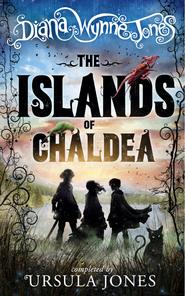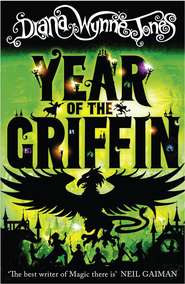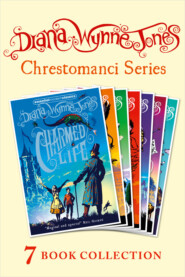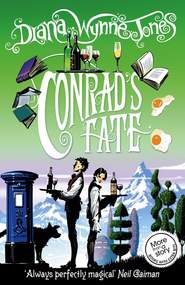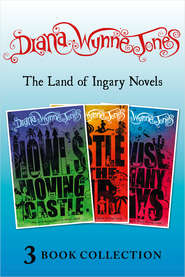По всем вопросам обращайтесь на: info@litportal.ru
(©) 2003-2024.
✖
Hexwood
Настройки чтения
Размер шрифта
Высота строк
Поля
(#uad1afb1d-a984-5aa1-a6a7-e5ccb7f0016c)
(#uad1afb1d-a984-5aa1-a6a7-e5ccb7f0016c)
There were still hailstones under the big grey car, but they were melting as Ann hastened past on her way to the path to Banners Wood. She did not stop for fear Mum or Dad called her back. She admitted that setting out to climb a tree in a tight skirt probably was silly, but that was her own business. Besides, it was so hot. The path was steamy-warm, full of melting hailstones winking like diamonds in the grass. It was a relief to get into the shade of the wood.
Grass almost never grew on the trampled earth under the trees, but spring had been at work here all the same while Ann had been ill. Shiny green weeds grew at the edges of the trodden parts. Birds yelled in the upper branches and there was a glorious smell in here, part cool and earthy, part distant and sweet like the ghost of honey. The blackthorn thicket near the stream was actually trying to bloom, little white flowers all over the spiny leafless bushes. The path wound through them. Ann wound with the path, pushing through, with her arms up to cover her face. Before long, the path was completely blocked by the bushes, but when she dropped to a crouch, she could see a way through, snaking among the roots.
She crawled.
Spines caught her hair. She heard her anorak tear, but it seemed silly to go back, or at least just as spiny. She crawled on towards the light where the bushes ended.
She reached the light. It was a swimming, milky lightness, fogged with green. It took Ann a second of staring to recognise that the lightness was water. Water stretched to an impossible distance in front of her, in smooth grey-white ripples that vanished into fog. Dark trees beside her bowed over rippled copies of themselves, and there was one yellow-green willow beyond, smudging the lake with lime.
Ann looked from the foggy distance to the water gently rippling by her knees. Inside her black reflection there were old leaves, black as tea-leaves. The bank where she was kneeling was overgrown with violets, pale blue, white and dark purple, spread everywhere in impossible profusion, like a carpet. The scent made her quite giddy.
“Impossible,” she said aloud. “I don’t remember a lake?”
“I don’t either,” said Hume, kneeling under the willow. “It’s new.”
Hume’s tracksuit was so much the colour of the massed violets that Ann had not seen him before. She had a moment when she was not sure who he was. But his brown shaggy hair, his thin face and the way his cheekbones stuck out, were all quite familiar. Of course he was Hume. It was one of the times when he was about ten years old.
“What’s making the ripples?” Hume said. “There’s no wind.”
Hume never stops asking things, Ann thought. She searched out over the wide milky water. There was no way of telling how wide. Her eye stopped with a gentle white welling in the more distant water. She pointed. “There. There’s a spring coming up through the lake.”
“Where? Oh, I see it,” Hume said, pointing too.
They were both pointing out across the lake as the fog cleared, dimly. For just an instant, they were pointing to the milky grey silhouette of a castle, far off on a distant shore. Steep roof, pointed turrets and the square teeth of battlements rose beside the graceful round outline of a tower. The chalky shapes of flags flapped lazily from tower and roofs, all without colour. Then the fog rolled in again and hid it all.
“What was that?” asked Hume.
“The castle,” said Ann, “where the king lives with his knights and his ladies. The ladies wear beautiful clothes. The knights ride out in armour having adventures and fighting.”
Hume’s thin face glowed. “I know! The castle is where the real action is. I’m going to tell Mordion I’ve seen it.”
Hume had this way of knowing things before she told him, Ann thought, gathering a small bunch of the violets. Mum would love them, and there were so many. Sometimes it turned out that Hume had asked Yam, but sometimes, confusingly, Hume said she had told him before. “The castles not the only place where things happen,” she said.
“Yes, but I want to get there,” Hume said yearningly. “I’d wade out through the lake or try to swim, if I knew I could get there. But I bet it wouldn’t be there when I got across the lake.”
“It’s enchanted,” said Ann. “You have to be older to get there.”
“I know,” Hume said irritably. “But then I shall be a knight and kill the dragon.”
Ann’s private opinion was that Hume would do better being a sorcerer, like Mordion. Hume was good at that. She would have given a great deal, herself, to learn sorcery. “You might not enjoy it at the castle,” she warned him, plucking the best-shaped leaves to arrange round her violets. “If you want to fight, you’d be better off joining Sir Artegal and his outlaws. My dad says Sir Artegal’s a proper knight.”
“But they’re outlaws,” Hume said, dismissing Sir Artegal. “I’m going to be a lawful knight at the castle. Tell me what they say about the castle in the village.”
“I don’t know much,” Ann said. She finished arranging her leaves and wrapped a long piece of grass carefully round the stalks of her posy. “I think there are things they don’t want me to hear. They whisper when they talk about the king’s bride. You see, because the king is ill with his wound that won’t heal, some of the others are much too powerful. There’s quarrelling and secrecy and taking sides.”
“Tell me about the knights,” Hume said inexorably.
“There’s Sir Bors,” said Ann. “He prays a lot, they say. Nobody likes Sir Fors. But they quite like Sir Bedefer, even if he is hard on his soldiers. They say he’s honest. Sir Harrisoun is the one everyone really hates.”
Hume considered this, with one tracksuited knee up under his chin, staring into the mist across the rippling lake. “When I’ve killed the dragon, I’ll turn them all out and be the king’s Champion.
“You have to get there first,” Ann said, beginning to get up.
Hume sighed. “Sometimes,” he said, “I hate living in an enchanted wood.”
Ann sighed too. “You don’t know your own luck! I have to be home for lunch. Are you staying here?”
“For now,” said Hume. “The mist might clear again.”
Ann left him there, kneeling among the violets looking out into the fog as if that glimpse of the castle had somehow broken his heart. As she crawled through the thornbrake, carefully protecting her bunch of violets in one cupped hand, she felt fairly heartbroken herself. Something impossibly beautiful seemed to have been taken away from her. She was almost crying as she crawled out from the bushes on to the mud path and stood up to trot towards the houses. And, on top of it all, she had torn her anorak, and her skirt, and she seemed to have quite a large cut in her knee.
“Hey, wait a minute.” she said, halting in the passage between the houses. She had cut that knee running away from Mordion. She looked from the dried blood flaking off her shin to the small bunch of violets in her hand. “Did I go into the wood twice then?”
I don’t think so, said the Boy. I lost you.
You went out of touch when you went into that wood, explained the Prisoner.
Yes, hut did I go in and come out and go in again? Ann asked them.
No, they said, all four of her imaginary people, and the King added, You only went in once this morning.
“Hm.” Ann almost doubted them as she limped slowly up the passage and into Wood Street. But the big grey car was still in the parking bay. There were other cars around it now, but when Ann bent down she could still see just a few hailstones, fused into a melting lump behind the near front wheel where the sun had not been able to reach.
That much is real, she thought, crossing the street slantwise towards Stavely Greengrocer.
In front of the shop she stopped and looked at boxes of lettuces and bananas and flowers out on the pavement. One of the boxes was packed full of little posies of violets, just like the one in her hand. Very near to tears, Ann poked her own bunch in amongst them before she went inside for lunch.
(#uad1afb1d-a984-5aa1-a6a7-e5ccb7f0016c)
Mordion was working hard, trying to build a shelter and keep a watch on Hume at the same time. Hume would keep scrambling down the steep rocks to the river. He seemed fascinated by the fish traps Mordion had made in the pool under the waterfall. Mordion was not sure how it had come about that he was in charge of such a small child, but he knew Hume was a great deal too young to be trusted not to fall into the river and drown. Every few minutes, Mordion was forced to go bounding down after Hume. Once, he was only just in time to catch Hume by one chubby arm as Hume cartwheeled slowly off a slippery stone at the edge of the deep pool.
“Play with the pretty stones I found you,” Mordion said.
“I did,” said Hume. “They went in the water.”
Mordion towed Hume up the rocks to the cave beneath the pine tree. This was where he was trying to build the shelter. It felt like the hundredth time he had towed Hume up here. “Stay up here, where it’s safe,” he said. “Here. Here’s some pieces of wood. Make a house.”
‘I’ll make a boat,” Hume offered.
And fall in the river for certain! Mordion thought. He tried cunning. “Why not make a cart? You can make roads for it in the earth here and – and – I’ll carve you a wooden horse for it when I’ve built this shelter.”
Hume considered this. “All right,” he said at last, doing Mordion a great favour.
For a time then there was peace, if you did not count the thumping as Hume endeavoured to beat his piece of wood into a cart shape. Mordion went back to building. He had planted a row of uprights in front of the cave, and hammered stakes in among the rocks above the cave. Now he was trying to lash beams between the two to make a roof. It was a good idea, but it did not seem to be working. Bracken and grass did not make good rope.






